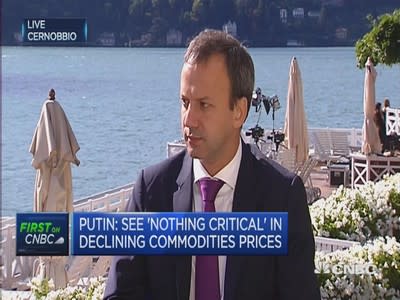Russia will not cut oil production: Deputy PM

Russia will not cut oil production, Arkady Dvorkovich, Deputy Prime Minister of the Russian Federation, told CNBC Friday.
"For Russia, given the structure of production, it's very difficult to cut supply artificially," he said. "If oil prices will be low enough for a long period of time, supply will go down in (a) natural way, and I think this (is the) most efficient stabilizer for the market."
Russia is a major oil producer and is highly dependent on the proceeds from the sale of oil, the prices of which have roughly halved in value since 2014 as a result of oversupply in global oil markets and concerns about weakening demand. Moscow meanwhile has been keen to keep its production high to defend its market share.
Dvorkovich said that Russia was used to fluctuating oil prices. "Certainly, we are better off with prices more like $80, $90 per barrel, but even with $50 and $60 we can optimize, rationalize budget expenditure and other spending to live normally with those levels."
Brent crude oil prices (Intercontinental Exchange Europe: @LCO.1) were trading at about $50.60 a barrel on Friday, while U.S. WTI oil prices (New York Mercantile Exchange: @CL.1) were at around $46.60 a barrel.
Commenting on the difficulties facing China, Dvorkovich said that the Chinese government had been able to manage its economy, "very well over the last few decades."
"On our side, we are confident that China will find ways to stabilise the situation now in the financial markets, and go to sustainable growth rates over the next few years," he said.
"Those rates are not going to be as high as before, it's clear, and nobody expects China to grow again at 10 percent per annum in the future, but six to seven percent is a quite natural growth rate for China, and we believe that the Chinese authorities will achieve that."
Signs of weakness in China's economy, the world's second biggest, and wild swings in the country's stock market have rattled global markets in recent weeks.
Commenting on the global impact of the Chinese downturn, Dvorkovich said it had caused a reduction of growth rates.
"Russia, Europe, all depend on Chinese development, so we are in permanent consultations with Chinese authorities, we know what they are doing and we believe that they will be able to come back to normal and help the rest of the world as it grows," he said.
Dvorkovich meanwhile described a widening of western sanctions against Russia for intervention in Ukraine as an extension of "stupid policies."
The Russian economy has been on a rollercoaster ride since the conflict erupted in early in 2014, with the country's currency and stocks hit hard by declining oil prices, capital outflows and soaring inflation.
Earlier this week, the U.S. widened sanctions imposed on Russia with the U.S. Federal Register adding 29 people to the sanctions list, according to a report from Reuters.
"First, all those hectic steps to impose new sanctions or to widen existing sanctions, for us it's just a continuation of pretty stupid policies conducted by our partners and friends," Dvorkovich said.
"They create (a) difficult situation not just for Russia (but) for themselves, for Europe in particular: Europe is losing a lot from the sanctions that initially have been imposed by the United States and to some extent I think sanctions against Russia directed at Europe, not at Russia."
"I think that at some point European authorities, European countries will think twice about continuing those policies," Dvorkovich added.
-CNBC's Holly Ellyatt contributed to this report.
More From CNBC

